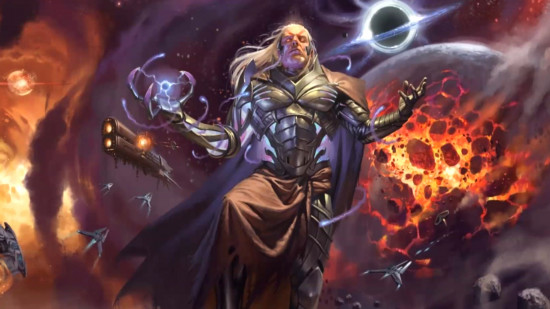Crossovers with properties like Marvel and Final Fantasy now make up half of all Standard Magic: The Gathering sets coming out in 2025 and beyond, and some fans are understandably afraid the Magic brand is in trouble. Are we on a slippery slope, with original Magic sets doomed to gradually be phased out to make way for the new planeswalkers in town: Patrick the Starfish and Ronald McDonald?
A recent post by Magic: The Gathering’s head designer Mark Rosewater might allay some fears. He says that even though Universes Beyond crossover sets sell better than original sets, “in-multiverse Magic sets are still important to Wizards as a business for numerous reasons”.
In this blogpost, posted November 5, Rosewater then goes on to list several reasons why Wizards isn’t about to abandon making sets featuring its own original characters and MTG planes (at least not in the next year or so). They can loosely be divided into drawbacks to Universes Beyond and advantages of original sets.
Looking at the latter first, Rosewater points out that “the Magic brand is bigger than the card game”. He says each in-multiverse MTG set strengthens the brand, which has long-term value for Wizards of the Coast. Personally, we’re not so sure the Magic brand is much larger than the game, but stuff like the upcoming Netflix series could certainly help to change that.
He also says that Wizards has the freedom to design whatever world elements suit the card game best with its own sets. The designers can include whatever mechanics they want and have total creative control. By contrast, Universes Beyond sets “have additional mechanical challenges” because the flavor is already set in stone.
Rosewater then adds that making original worlds is creatively fulfilling, and that the people at Magic want to make them, but we’re not sure that’s going to have much sway with the Hasbro overlords.
The constraints and restrictions of Universes Beyond sets might actually be more important when it comes to saving in-universe Magic. Rosewater reveals that UB sets take an additional year to make because every element has to be approved. He explains that this can also make them prone to timeline slipping and that “in-multiverse Magic sets are a constant that we can plan around”.
That line seems pretty revealing about how Wizards and Hasbro sees its original sets: as a predictable income source that can keep things ticking over to support the real money makers.
UB products also come with a licensing cost, making them a little riskier than in-universe sets. Clearly that risk has paid off so far with high-grossing releases like Tales of Middle Earth and the Fallout Commander decks, however.
For more, check out our MTG release schedule guide, and don’t miss our list of the best trading card games.
Source: Wargamer




